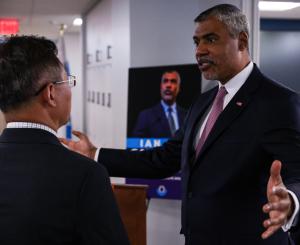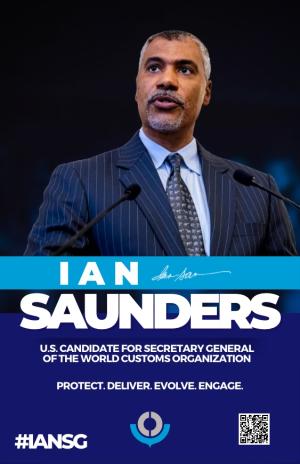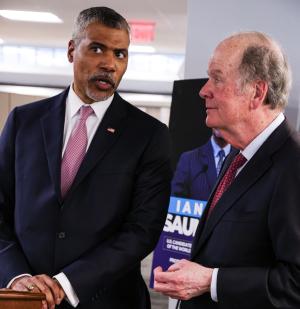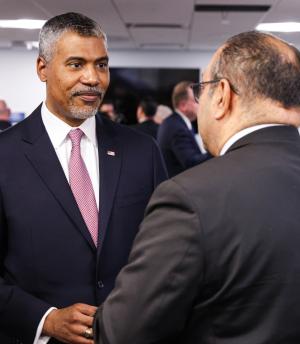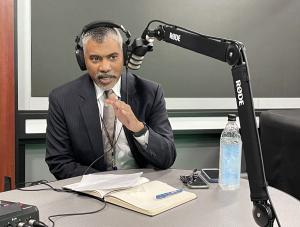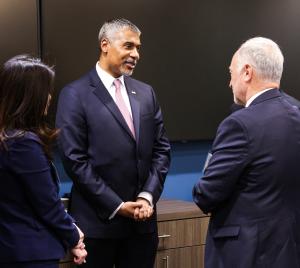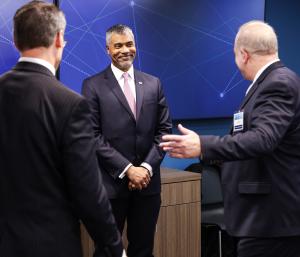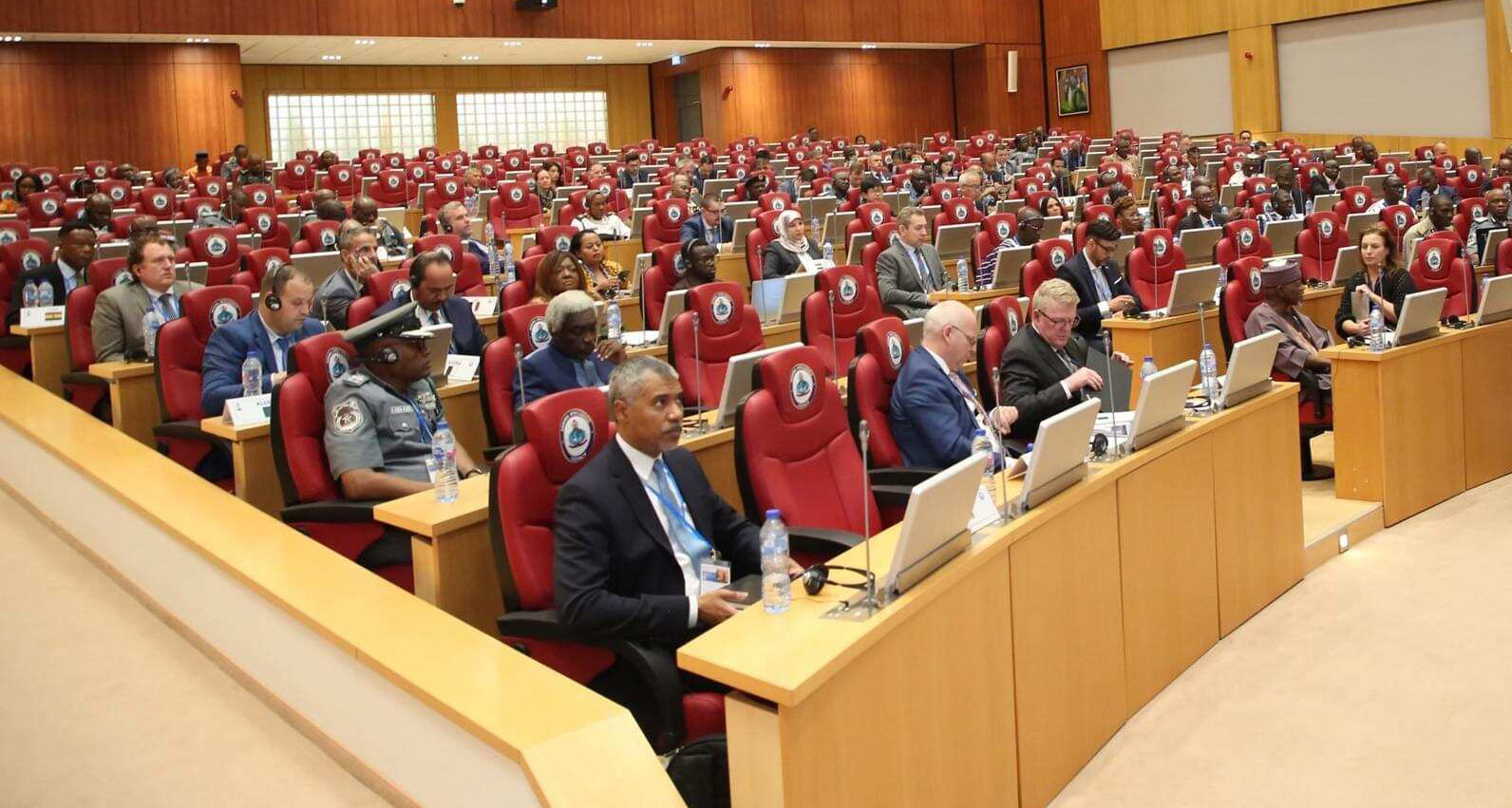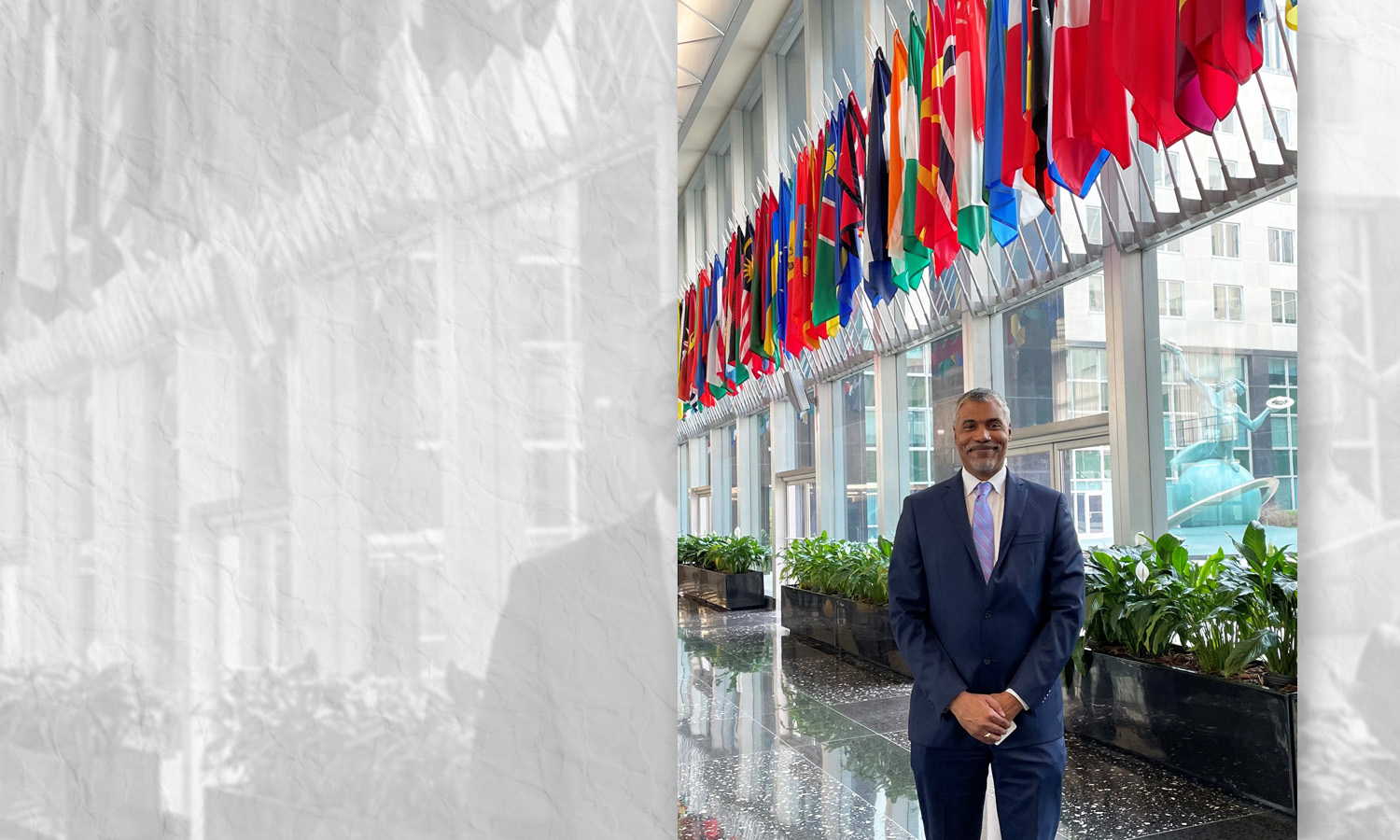
U.S. Candidate Ian Saunders
Ian Saunders, the U.S. candidate nominated for secretary general of the World Customs Organization, stands in the foyer of the U.S. Department of State’s headquarters in Washington, D.C., after meeting with colleagues to discuss international trade issues. Photo by Diana Marvin. Graphic by Janice Swan-Jones.
It was big news in the trade community when Ian Saunders was nominated in January as the U.S. candidate to lead the World Customs Organization in Brussels as secretary general. The last time a U.S. official led the WCO, the customs equivalent to the United Nations, was 25 years ago.
Saunders is currently the deputy assistant secretary for the Western Hemisphere at the International Trade Administration within the U.S. Department of Commerce and has more than 30 years of experience in customs and international trade. He began his career as a student trainee at the former U.S. Customs Service, a CBP legacy agency, and worked his way up to leadership roles in the federal government’s Senior Executive Service. Along the way, he held senior positions at U.S. Customs and Border Protection and the Federal Highway Administration. He was responsible for overseeing international policies, capacity building, information sharing and global technology exchange programs. Saunders led multiple U.S. delegations to the WCO and chaired the organization’s Permanent Technical Committee from 2018 to 2020 while serving as CBP assistant commissioner for International Affairs. He is responsible for developing programs, policies and strategies to strengthen commercial cooperation in the Western Hemisphere in his current position at the Department of Commerce.
The WCO was established in 1952 and is the only international body dedicated to developing customs standards and instruments. It is independent of the United Nations and has 185 customs administration members worldwide. The WCO and its members collectively work to lower the costs of trade, facilitate cross-border movement of essential goods and protect society from unsafe products.
Elections for WCO secretary general – the senior-most position responsible for providing executive management and overall strategic direction to the organization – are held every five years. The next election will be June 24, 2023, and will be open to the 185 heads of customs agencies throughout the world who are members of the WCO.
Frontline magazine caught up with Deputy Assistant Secretary Saunders in April to discuss his vision for the WCO and his key priorities.
Q: What inspired you to run for the secretary general position of the World Customs Organization?
Deputy Assistant Secretary Saunders: The United States has a lot to offer the organization. We’ve had a good track record of supporting the products of the World Customs Organization with our expertise. We’ve seen approaches similar to ours replicated around the world, approaches that create predictability for trade, that improve security in other countries and the United States. So, as a country, we have done a lot of work supporting the WCO at a technical level. What we haven’t done since the 1990s is offer our leadership at the top level of the organization. At a time, when change is very rapid, and the way we do business is changing, I saw an opportunity to contribute in a different form to an organization that will continue to be critical for international trade. Because as the conditions of trade change, we need to have consistency and reliability in customs operations. This is an opportunity I think will help that cause.
Q: It has been noted that the disruptions in the supply chain that have been felt in every American household also inspired you to run for this position. How did this influence your decision?
Deputy Assistant Secretary Saunders: Supply chain disruption is something that all of us have lived with during the pandemic. In its starkest form, we have experienced not having basic goods available that we’ve needed. We also came to terms with the fact that delays in customs clearance can be a life-or-death matter when it comes to personal protective equipment, other medical devices, and vaccines. How do we make sure that customs is working alongside other agencies that make border decisions so that disruptions that could mean life and death don’t happen again or don’t happen in the same way? Running for this position at the World Customs Organization is an opportunity to bring some of that perspective into the organization. In my current role as the deputy assistant secretary for the Western Hemisphere at the International Trade Administration, I saw through the eyes of the private sector and the stakeholder community what customs disruptions really mean as a practical matter. So, if this is an opportunity for me to contribute to those sorts of problems not happening again, then this is an opportunity I have to take.
Q: Tell us something that will give us a better appreciation of who you are and understand why you are the best candidate for the position.
Deputy Assistant Secretary Saunders: Throughout my career, I have been looking at how to make international trade better, understanding that if trade grows, economies grow. As economies grow, the standard of living increases around the world. I fully believe that the work that customs administrations do is responsible in many ways for the standard of living that we enjoy. It also contributes to the standard of living that other countries would like to enjoy both in terms of creating the revenue that helps societies directly, but also enabling the economic growth and investment that will help long-term growth and sustainability of economies overseas. All of that is to say that this is a cause that I very much believe in. It is one that I’ve taken a lot of time to actually learn. I was fortunate to have leaders at customs who invested in me and gave me the opportunity to learn the discipline from the inside out. I have also held international positions where I not only had to understand how our systems work, but why the pieces are put together the way they are so that I can portray them in a clear way to foreign peers. As the WCO’s secretary general, I would be able to give back to a community that has not only been very important in my own personal career development, but also plays a very critical role in our lives here in America and the type of lives we hope others have around the world.
Q: What is your vision for the future of the World Customs Organization?
Deputy Assistant Secretary Saunders: My vision for the WCO is to have an organization that builds on its past. The WCO is responsible for a lot of the consistency that we have in the management of local trade now. But I want to make sure that we’re building an organization that is focused on providing the right information products and services to members that will allow them to protect their societies better from both a revenue and a security perspective. I want to help customs administrations evolve, which gets to the issue of modernization and the development of the workforce. Customs organizations need to be prepared to address not just what is happening today but be positioned to be able to address what is coming down the pike. With the right tools and the right people and the right processes, customs administrations will be able to withstand whatever shocks may come in the future.
The last part of my vision is to help members engage and to help the WCO itself engage. I want to make sure that we have the infrastructure and ability to engage as many members as possible in the formulation and the development of our tools so that the uptake after their completion is better. Because when people are part of the process, they understand it in a way that they wouldn’t if they only saw the end result. My vision also includes engaging the private sector in a different way. The WCO’s individual customs administrations have constraints on their resources, and we need to find ways to mine the expertise and resources of the private sector that shares an interest in seeing international trade function well. We need to engage in a way that allows those insights and those resources to be brought to bear on the problems that are bigger than any one of us alone.
Q: How does your vision affect the mainstream public?
Deputy Assistant Secretary Saunders: When customs works well, it’s taken for granted. So much of what we consume is imported and it gets to us safely because customs is doing its job. Conversely, there are a lot of dangerous things that don’t reach us because customs is doing its job. By making the WCO better and making member customs administrations stronger and more effective, we ensure that the products we’re accustomed to importing have protections in place so we’re not overrun with extremely dangerous items that would compromise our way of life. That’s not to say that customs operations are perfect. We still have narcotics problems and other prohibited items that we’re not able to catch. But we benefit, as a society, from customs doing its job well. My vision is about making sure that we continue to improve our customs operations here and in countries around the world.
Q: What are some of the key areas in international trade that you would like to focus on?
Deputy Assistant Secretary Saunders: The border transaction is fundamental to international trade. You can get every other part of the process right and it rises and falls based on the efficiency, effectiveness and safety of the border clearance process. The membership of the WCO, 185 countries, manages well over 90% of international trade. So, if we can raise the bar, raise the practice of all of the members of the WCO, we’re creating more efficiency, more safety, more security for the United States, other countries, and for the vast, vast majority of what is traded internationally.
Q: Gender equality is another area you have expressed a desire to focus on. Could you share your views on why you feel this is important?
Deputy Assistant Secretary Saunders: Diversity in the workforce, particularly gender equality, warrants our attention at the World Customs Organization. I’ve heard from numerous members that this is an issue of concern. The 2022 WCO Annual Survey showed that, on average, 38% of customs employees are women and 62% are men. In leadership positions, there is even greater disparity. Twenty-two percent of senior management positions within customs administrations are held by women and only 17% of heads of customs are female. As of today, customs organizations don’t reflect society and as such, we don’t have access to the full range of problem-solving perspectives or the widest array of talent. My sense is that workforce diversity and specifically gender equality are two areas that we can pursue to ensure that every motivated human resource is brought to delivering our customs mission.
To address this, I would like to establish a senior advisory council that contemplates these issues, champions the cause, and provides timely and concrete guidance to the WCO leadership. I also will explore how we can highlight successes that have resulted from workforce diversity and find ways to celebrate them as reflective of one of our community’s key values. I will rely on the expertise and ideas of members who have developed these good practices. My commitment to creating greater diversity and gender equality remains firm. This is something that will strengthen the core of customs organizations.
Q: How can the World Customs Organization help with the fight against drugs?
Deputy Assistant Secretary Saunders: We need to make sure that the WCO is providing guidance and supporting the exchange of enforcement information so that member customs administrations can do a better job of stopping illicit drugs from entering both destination and transit countries. This is a problem that persists. Although we have many security challenges at the border that go beyond drugs, the problem with drugs has not gone away. So, we need to increase the capabilities of customs administrations in this fight. It will help countries such as the United States that consume these drugs as well as the source countries where the narcotics emanate from. Wherever this traffic is, it creates a negative impact across society. Strengthening more customs administrations to lessen that problem is good for us all and the WCO can help.
Q: How do you intend to engage with all the members of the various regions of the globe?
Deputy Assistant Secretary Saunders: By taking advantage of the regional vice chair structure that already exists within the World Customs Organization. I would make sure that we’re using that as a way to really mine the experience of members and consistently get their feedback. I don’t think there really is any substitute for direct outreach with key members and making sure that they know the secretary general of the organization is listening, though I’m also mindful we have 185 members.
Q: Could you explain your positive approach regarding innovation? Why is it important to include stakeholders when seeking solutions to trade and customs issues?
Deputy Assistant Secretary Saunders: Innovation is how we solve problems that we haven’t encountered. So, creating a culture that values new ideas and provides space for those ideas to be explored is something that is extremely important to me. I want to make sure that we have a forum at the World Customs Organization that allows member administrations to share the great ideas they’ve been exploring and implementing so that they become known across the community. We can then see if others have a similar interest and determine how we can get better uptake. Not because the WCO created these ideas, but because it’s something that makes sense, and it has been shared by members. This type of environment emphasizes the importance of innovation and as we’re all invested in it individually, we need to make sure the products we design make it into the collective somehow. We also need to look at how innovation can help us modify products or expand the WCO’s offerings so that member administrations can execute the good ideas that come forth in the process.
Q: Do you have any examples of how innovation has been able to solve something or why it’s important to be innovative?
Deputy Assistant Secretary Saunders: A really good example is the development and evolution of nonintrusive inspection technology. These are the devices that allow us to look inside containerized or palletized cargo to see if there’s anything in there that shouldn’t be. Nonintrusive inspection technology allows customs organizations to detect things without physically doing an inspection. Officers can check bulk cargo for anything that might prove dangerous or is something other than what was declared to customs.
Nonintrusive inspection technology was a novelty in the 1990s. It’s now a fundamental part of how many customs administrations do business. They could not manage the volume that they do without this technology. Over time, what we’re able to see and how we’re able to analyze images has improved. This technology has had an immense impact on our safety and security as well as the efficiency of our cargo processing. Because when nonintrusive inspection equipment works well, physical inspections, which are time consuming and costly, don’t take place as often.
Q: How do you intend to build the World Customs Organization’s relationships with other international organizations such as the World Trade Organization or WTO?
Deputy Assistant Secretary Saunders: The good news is the WCO has a number of cooperative arrangements with international organizations. First, I would familiarize myself with the environment and the key players to gain an understanding of what has happened with the relationships thus far. Then I would be very interested in identifying specific projects based on shared interests that we can pursue so that there is a tangible manifestation of cooperation between the WCO and a particular international organization. If we can find things that we are both invested in and create a very specific success, it will create motivation for more cooperative work over time. And then the foundation of the cooperative agreement arrangements that we have in place will be strengthened in a practical sense.
Q: What will you do to ensure the World Trade Organization’s Trade Facilitation Agreement advances? Why is this important?
Deputy Assistant Secretary Saunders: The WTO Trade Facilitation Agreement is the one binding instrument that obligates governments to take on functions that will ensure easier movement of legitimate trade. As a practical matter, the mechanics of border clearance make customs a very prominent feature of the agreement. It includes things like availability of information so that traders know what they need to do to comply with the border clearance process and satisfy legal requirements. It also includes advanced rulings and classifications, which enable customs agencies to tell importers how their goods will be classified and help them figure out what the duty payment for the shipment will be in advance of its physical arrival. All of this is with an eye toward making sure that legitimate trade doesn’t have any unreasonable obstacles that prevent it from moving across the border. This is very important for customs administrations because they are the executive agents for most of these functions either directly or in coordination with other agencies that have border-related decision responsibilities like the Food and Drug Administration or other regulatory agencies that control specific types of goods that cross the border.
In my current work at the Department of Commerce, I see what the specific border clearance obstacles are in practical terms. I also can see where there are elements of the Trade Facilitation Agreement that aren’t being implemented fully or as expected. So, I will be able to bring a real world perspective to help guide the World Customs Organization toward changes that will address these problems.
Q: Why are you the best candidate to ensure that customs administrations will continue to improve, modernize, and innovate? Why are you qualified to do this?
Deputy Assistant Secretary Saunders: I’ve been fortunate in my experience to work with customs administrations around the world and to have an understanding of their challenges, their changes over time, not just in the Americas, but in every region of the world. That local understanding combined with the experience of seeing how our own processes here in the United States evolved gives me some insights on how to be helpful to the organization. Moreover, this is work that I care about and I want to see it done well. I’m personally motivated to seeing improvements.
Q: How did you become interested in customs?
Deputy Assistant Secretary Saunders: I’m second-generation customs. My aunt and uncle worked for the U.S. Customs Service, one of CBP’s legacy agencies. My aunt worked in Regulations and Rulings and my uncle was one of the creators of the U.S. government’s earliest cargo processing system. He was involved with the computer aspects. My aunt would come into the office on Saturdays to do a little work. I would sit next to her while she redacted documents. I was a curious kid and was always asking her what she was doing and why. I actually was learning more about customs than any 7-year-old should probably know. So, I’ve known about customs for a very long time. I fell into the job because my aunt and uncle helped me to understand what it was and then they helped me get my first internship.
Q: How will you help WCO members keep their momentum, interest, and energy in modernizing?
Deputy Assistant Secretary Saunders: As we know from our own experience in the United States, it’s not an inexpensive proposition to modernize. The issues are cost and access to expertise. There’s some real implementation barriers there. But something I think would be powerful is highlighting the experiences of developing administrations that have had successes in modernizing. It’s one thing to hear a story of modernization from a large, well-resourced organization like ours. It’s quite another to hear something from a peer organization that has very similar circumstances, but even with those constraints has been able to make some significant advances. Sharing stories from a variety of member organizations that have executed at least partial modernization shows others that this isn’t abstract. It’s doable. So, I would create opportunities for a broader spectrum of members to share their modernization stories in an effort to motivate others.
Q: Do you have any closing thoughts you’d like to share?
Deputy Assistant Secretary Saunders: Thirty plus years ago when I joined the U.S. Customs Service, I never could have imagined my candidacy for the secretary general position at the WCO would be a possibility. So, it is very humbling to be asked to do this by one’s country and to have such a positive reception by the customs community. It is a great honor to have this opportunity to do public service on a stage of this magnitude and to give back to the organization, the community that shaped my career.



